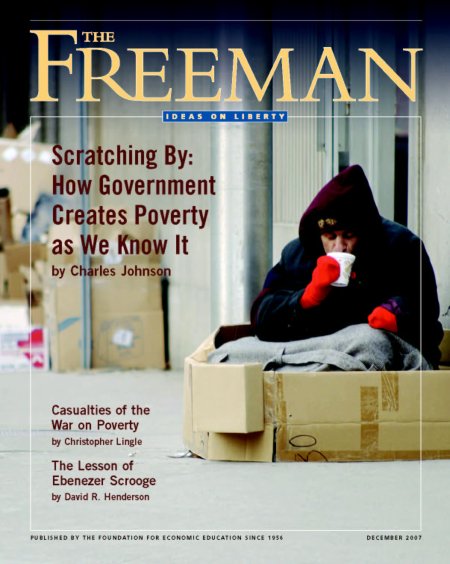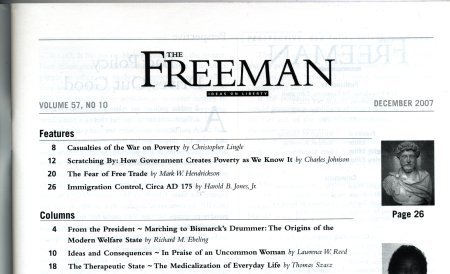Carson in the Freeman: Hierarchy or the Market
I’ll be posting about my talk at the LP meeting soon, I promise, but I just blew an afternoon on painting a fence (in order to appease our complex’s property manager). I hear that this is the sort of thing that’s supposed to make men feel a sense of vigor and pride and accomplishment. But mostly it just made me want to take a hot bath and zone out with the TV until tomorrow.
Fortunately, other people do the thinking so I don’t have to. In particular, here’s a shout-out and congratulations to Kevin Carson (and thanks also to the indefatigable Sheldon Richman) for another fine article in The Freeman, on Hierarchy or the Market:
F. A. Hayek, in The Use of Knowledge in Society, used distributed, or idiosyncratic, knowledge—the unique situational knowledge possessed by each individual—as an argument against state central planning.
Milton Friedman's dictum about
other people's moneyis well known. People are more careful and efficient in spending their own than other people's money, and likewise in spending money on themselves more so than in spending money on other people.A third insight is that people act most efficiently when they completely internalize the positive and negative results of their actions.
The corporate hierarchy violates all of these principles in a manner quite similar to the bureaucracy of a socialist state. Those at the top make decisions concerning a production process about which they likely know as little as did, say, the chief of an old Soviet industrial ministry.
The employees of a corporation, from the CEO down to the worker on the shop floor, are spending other people's money, or using other people's resources, for other people. Its managers, as Adam Smith observed 200 years ago, are
managers rather of other people's money than of their own.By its nature, the corporation substitutes administrative incentives for what Oliver Williamson called the
high powered incentivesof the market: effort and productivity are separated from reward.. . . The state's entry barriers, like licensing and capitalization requirements for banks, reduce competition in the supply of credit and drive up its price; enforcement of artificial titles to vacant and unimproved land has a similar effect. As a result, labor's independent access to capital is limited; workers must sell their labor in a buyer's market; and workers tend to compete for jobs rather than jobs for workers.
State subsidies to economic centralization and capital accumulation also artificially increase the capital-intensiveness of production and thereby the capitalization of the dominant firm. The effect of such entry barriers is to reduce the number of employers competing for labor, while increasing the difficulty for small property owners to pool their capital and create competing enterprise.
The cumulative legacy of these past acts of state-assisted robbery, and ongoing state-enforced unequal exchange, determines the basic structural foundations of the present-day economy. These include enormous concentrations of wealth in a few hands, the absentee ownership of capital by large-scale investors, and a hired labor force with no property in the means of production it works.
Necessarily, therefore, the absentee owners must resort to the expedients of hierarchy and top-down authority to elicit effort from a workforce with no rational interest in maximizing its own productivity.
. . .
The problem is not hierarchy in itself, but government policies that make it artificially prevalent. No doubt some large-scale production would exist in a free market, and likewise some wage employment and absentee ownership. But in a free market the predominant scale of production would likely be far smaller, and self-employment and cooperative ownership more widespread, than at present. Entrepreneurial profit would replace permanent rents from artificial property and other forms of privilege. Had the industrial revolution taken place in a genuine free market rather than a society characterized by state-backed robbery and privilege, our economy today would probably be far closer to the vision of Lewis Mumford than that of Joseph Schumpeter and Alfred Chandler.
— Kevin Carson, The Freeman 58.3 (April 2008): Hierarchy or the Market

